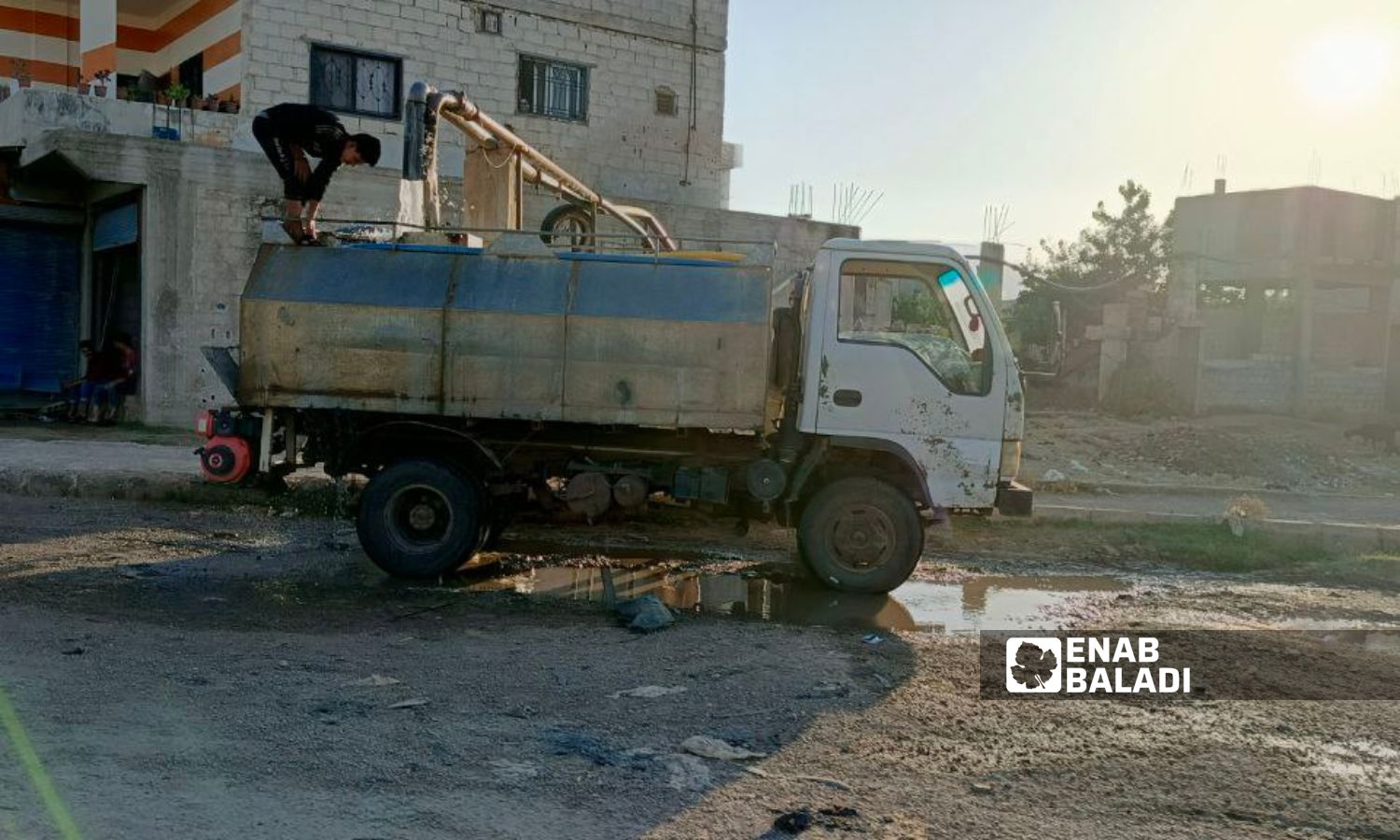



Daraa – Halim Muhammad
The prices of drinking water in the town of Tal Shihab in the western part of Daraa governorate near the Jordanian border have increased, affected by a wave of drought that hit the area, while alternatives remain costly for residents.
The price of a water barrel (200 liters) reached 7,000 Syrian pounds compared to 3,000 pounds last summer.
Families need around five barrels of water daily with rationing, pushing some families to economize on consumption, according to residents of Tal Shihab who spoke to Enab Baladi.
Walid (40 years old), a resident of the town, needs to buy five barrels at the cost of 30,000 pounds, enough for his family for two days with severe consumption rationing.
Walid said to Enab Baladi that securing the cost of water has become a daily “concern,” as he works in a shop with a daily wage not exceeding 40,000 Syrian pounds.
He added that this suffering is new to the town’s inhabitants after a drought struck the area’s springs, which are the only water source for the town of Tal Shihab, home to approximately 15,000 people.
Mohammed (27 years old), another resident, says his household needs five barrels of water daily, especially since he keeps three cows that also require water.
He added to Enab Baladi that during the summer, alongside continuous power outages, family members need frequent showers. Despite this, they impose rationing to lower water costs.
According to Mohammed, water consumption varies among families depending on the number of household members, their habituation to consumption rationing, and whether they have livestock.
Mohammed contracts a tanker to fill his home tanks, which have a capacity of up to 20 barrels, as he told Enab Baladi.
The rise in diesel prices at the beginning of this June pushed water sellers using tankers to increase the price of drinking water barrels.
Mohammed al-Salah, a water tanker seller, told Enab Baladi that the increase in diesel prices prompted him to raise water barrel prices, especially as the water sources have become distant following the drought at Hot Springs (Oyoun al-Sakhina), which used to be a primary source for Tal Shihab.
Al-Salah’s tanker has a capacity of 30 barrels, through which he sells water across the town.
The Hot Springs dried up at the beginning of this June; this is the second consecutive year they have dried up. They dried up last summer, resumed flowing in winter, then dried up again at the start of this summer.
Al-Salah added that after the springs dried, the current water source is limited to wells in the town of Muzayrib, approximately seven kilometers away, increasing diesel consumption.
Mamoun al-Masry, Director of Water Resources in Daraa, told the local “Global” website that thousands of illegal wells led to the drying up of the Hot Springs, the main water source for Tal Shihab, now drying up in summer and flowing in winter when farmers do not need to irrigate their crops.
He pointed out the need to remove encroachments on the spring flow lines, calling on the local community to intervene and support the directorate in closing these encroachments.
The World Food Programme (WFP) implemented a project to extend a new water pipeline from the Hot Springs to the main tanks in Tal Shihab, after the old line was damaged with increased encroachments. However, residents told Enab Baladi that this project is ineffective after the springs dried up, only serving the town in winter.
Walid, a resident of Tal Shihab, said the project would only benefit the town in the current circumstances during winter, as the springs dry up in summer like most springs in western rural areas.
He added that it would be better to connect this project to the al-Ashari project, which supplies water to Daraa city from abundant springs, or to find solutions to restore water to the spring, such as filling illegal wells along the spring’s flow.
The Director of Water Resources in Daraa told the local website that his directorate is planning to drill an artesian well in the town and connect it to the network, but price differences prevented contracting with bidders.
He added that the directorate is currently preparing a new study and evaluation of the project’s cost.
Dignitaries in Tal Shihab told Enab Baladi that the delay in drilling the well is due to the directorate’s refusal to contract with unauthorized well rigs, while the number of licensed rigs is scarce in the governorate.
An alternative solution involves drilling wells at residents’ expense within neighborhoods and equipping them with solar systems, but the decline in groundwater levels has prevented water availability in most areas.
Mohammed, a town resident, drilled a well 150 meters deep next to his house, costing 250,000 pounds per meter, but it dried up two days after operation.
He added to Enab Baladi that in some areas, water is available from wells, but it is sulfuric or calcareous, smelling bad and unhealthy.
Most western rural towns in Daraa suffer from drinking water scarcity, especially after the drying up of Zeyzoun, Muzayrib, Ayn al-Abd, and Oyoun al-Sakhina.
Residents in these areas rely on tanker and well water that lack automated disinfection processes since governmental water pumps are connected to electronic disinfection devices, which are unavailable in private wells and tankers, exposing residents to health risks, especially with the spread of infectious diseases like hepatitis and typhoid fever.
if you think the article contain wrong information or you have additional details Send Correction